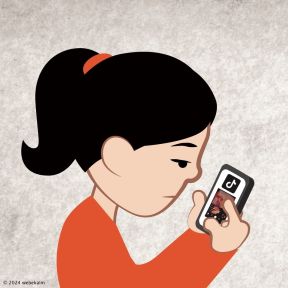
Video Game Addiction
A gaming disorder, sometimes referred to as “video game addiction,” is a pattern of game-playing behavior—involving online gaming or offline video games—that is difficult to control and that continues unabated despite serious negative consequences in other areas of the gamer’s life.
Contents

Experts debate whether severely problematic gaming truly constitutes an “addiction” in the same sense as drug and alcohol addictions. But disordered gaming behavior recently received official recognition as a mental health condition by the World Health Organization (WHO), which included “gaming disorder” in the 11th edition of its International Classification of Diseases (ICD-11). According to that guide, gaming disorder is marked by “impaired control” over gaming, which leads to it taking priority over other interests and activities. The gaming behavior persists even as it causes “significant impairment” in areas such as personal relationships, school, or work.
While gaming disorder is not officially included in the Diagnostic and Statistical Manual of Mental Disorders, widely used for behavioral health diagnoses in the U.S., the latest version of the manual—the DSM-5—refers to Internet Gaming Disorder as a condition for further study.
Among the tentative criteria for such a disorder are withdrawal symptoms, such as irritability or sadness, when Internet gaming ceases; tolerance, or an increasing need for gaming; deception about the amount of one’s gaming; and failed attempts to control one’s gaming.
Experts are critical of creating a gaming disorder diagnosis for several reasons. One is the fear of pathologizing normal human behavior, which treatment providers could potentially exploit for profit; some argue that the proposed symptoms of Internet gaming disorder may reflect passion for a hobby rather than a clinical condition.
Some argue that there is not enough compelling evidence for a gaming addiction and its discerning criteria. An addiction may reflect underlying psychological conditions that problem gamers are likely to have, suggesting that gaming disorder is not a discrete condition.
Colloquially, people tend to use gaming disorder and gaming addiction interchangeably. But some researchers believe the criteria and language put forth to diagnose gaming disorder doesn’t fully capture the nature of addiction.
Both the gaming industry and gamers themselves have objected to the creation of a gaming disorder, pointing to the lack of definitive evidence, risk of misdiagnosis, and the benefits that some derive from gaming. The industry is correct in pointing out the debates around behavioral addictions, although they may also be driven by self-interest.
Addictions have historically been defined by substances that lead to destructive behaviors in pursuit of the next fix. However, as technology has improved, f-MRI data along with mounting evidence suggests that behavioral addictions are more like substance addictions than initially believed; addiction resides not in the properties of a substance but the interaction between those properties and a person's vulnerability to addiction. A wide variety of behaviors can induce an addiction-like state that scientists debate where to draw the line between a coping mechanism, a symptom of another disorder, and addiction.
Gambling disorder is the only behavioral addiction included in the DSM-5. But researchers and clinicians have long debated many others, including video gaming, Internet use, exercise, shopping, sexual behavior, porn use, and others.

Online and offline gaming can have social and recreational benefits, and most people who play them will not exhibit clinically problematic use. The kind of gaming behavior that concerns mental health experts involves a prolonged or recurring habit that comes at the expense of a person’s functioning outside of games and that may damage close relationships or interfere with the pursuit of educational or career goals.
A passionate engagement with games or even an extended bout of intense gaming doesn’t indicate a disorder or an addiction if it does not disrupt a person’s life. The ICD-11 advises that hard-to-control gaming that crowds out other aspects of life should typically be evident for a year or longer in order for a diagnosis to be made.
Since gaming disorders are defined and measured in different ways, estimates of their prevalence vary widely. Representatives of the WHO, which established gaming disorder as a diagnosis, have emphasized that those who could be classified as having it make up a small proportion of gamers overall. According to the DSM-5, disordered Internet gaming seems to appear most among male adolescents.
According to the gaming disorder diagnosis in the ICD-11, signs include:
• The inability to control gaming, such as not being able to stop.
• Prioritizing gaming over other interests and activities.
• Continuing to game despite negative consequences, such as losing a job.
According to the DSM-5 proposed criteria for a potential Internet gaming disorder, signs include:
• Preoccupation with gaming.
• Symptoms of withdrawal when unable to play video games, such as irritability or anxiety.
• Tolerance over time—needing to play more or more powerful games.
• Inability to control gaming.
• Loss of interest in other activities.
• Excessive gaming despite negative consequences personally or professionally.
• Deception about gaming habits.
• Gaming to escape negative emotions.
• Jeopardizing or losing a relationship, job, or other opportunity due to gaming.
One large-scale study concluded that 1.4 percent of video gamers may have an addiction. Other studies, conducted in various parts of the world and with various age groups and assessment criteria, have revealed prevalences of addiction among gamers ranging from 0.6 percent to 6 percent. Across all of these studies, what is clear is that the vast majority of video gamers do not have an addiction.
A number of risk factors have been linked to video game addiction. Male adolescents seem especially prone to problematic gaming. Researchers have linked excessive gaming to traits such as impulsiveness, higher acceptance of violence, and lower social skills. Related mental health diagnoses include ADHD, depression, and anxiety. Motivation also matters; people who game for fun or to be social seem less likely to become hooked than people who game for status or to escape from their problems.
Dopamine pathways become active when people play video games, although those same pathways are activated by most pleasurable activities. Research suggests that video gaming may raise dopamine to about double its resting level, whereas drugs like heroin, cocaine, and amphetamine raise dopamine by roughly 10 times that much.
Video games activate the brain regions involved in the task at hand. Research suggests, for example, that games involving visual acuity and attention activate parts of the brain that underlie visual acuity and attention. Games involving spatial memory activate parts of the brain involved in spatial memory. Gaming not only activates many brain areas, but it may also lead to growth in some of those areas over time.
Cognitive Behavioral Therapy (CBT) can reduce problematic behaviors such as compulsive video game use by helping people to identify the template with which they view the world and to develop healthy ways to cope and adapt. Various forms of therapy and medications can treat the mental health challenges that often accompany addictive behaviors, such as depression and anxiety. Inpatient treatment centers and group therapy programs may also be valuable in certain cases.

About 90 percent of adolescents report playing video games of some kind, according to a 2018 survey by Pew Research Center. With the amount of time children and teens spend gaming, it’s natural for parents to wonder how video games affect their children, if they should implement rules around screen time, and whether they should be concerned about their children’s mental health. It can especially difficult for parents to know how to proceed because children's entire social lives may take place through gaming. Identifying why a child plays video games is often the first step of understanding how to curb video game use and help cultivate balance in children’s lives.
A gaming addiction involves a lack of control despite adverse consequences—if your child can pull themselves away from a game to join the family for dinner, for example, and shows interest in other activities, like sports or socializing, the child doesn’t have an addiction. Kids may be drawn to video games because they satisfy psychological needs such as competence, autonomy, and connection, which are sometimes difficult to find in other places.
Video games are often intentionally designed to capitalize on users’ attention and engagement, such as through patterns of rewards that users receive. But gaming has other qualities that make it appealing as well, especially to children. Users create avatars through which they can remain anonymous while expressing their unique traits and qualities. Friendships and communities form around gaming. Video games also provide positive feelings due to goal achievement and problem solving.
Parents often express concern that their children won’t quit gaming. Parents who want to curb excessive gaming can set limits on their child’s time that emphasize the balance of activities like sleep and schoolwork. Parents can ask children to silence notifications about their games so there are fewer temptations. It can also be valuable to try playing with a child to better understand their interest and to provide positive reinforcement when children do something right, because praise sometimes changes behavior when reproach does not. Helping children develop skills to navigate stress, social situations, and other challenges is also important.
Although children may be physically isolated while playing video games, they’re often spending time with friends—video games can be extremely social. And research shows that communication during games is not just about the task at hand but about social and emotional themes as well.
The fact that gaming can drive a child's entire social life puts parents in a bind. Although it's healthy to balance time online and off, the social needs children meet through gaming can sometimes outweigh the decision to stop them.
When kids have trouble balancing video game play with the rest of their lives, it’s important to understand why they are playing. (This is true of any mental health condition.) Most children play video games to simply have fun—games are challenging, competitive, exploratory, and social. But sometimes a child may be playing because of other reasons, such as depression, loneliness, social anxiety, and ADHD. Understanding the feelings and experiences that drive a child to play video games is key to helping them balance or stop playing video games.
The graphic and violent nature of some video games has led many parents (and others) to question if these games translate into real-world aggression. Analyses of violent crime and video violent game use find no evidence that increased sales of violent video games lead to a spike in violent crimes. In fact, some evidence suggests that as more youth play video games, rates of youth violence have decreased.
On an individual basis, however, violent video games may be scary and inappropriate for some kids. Understanding each child’s needs and creating a plan with rules for media use and screen time can be a healthy way for families to approach video games.














